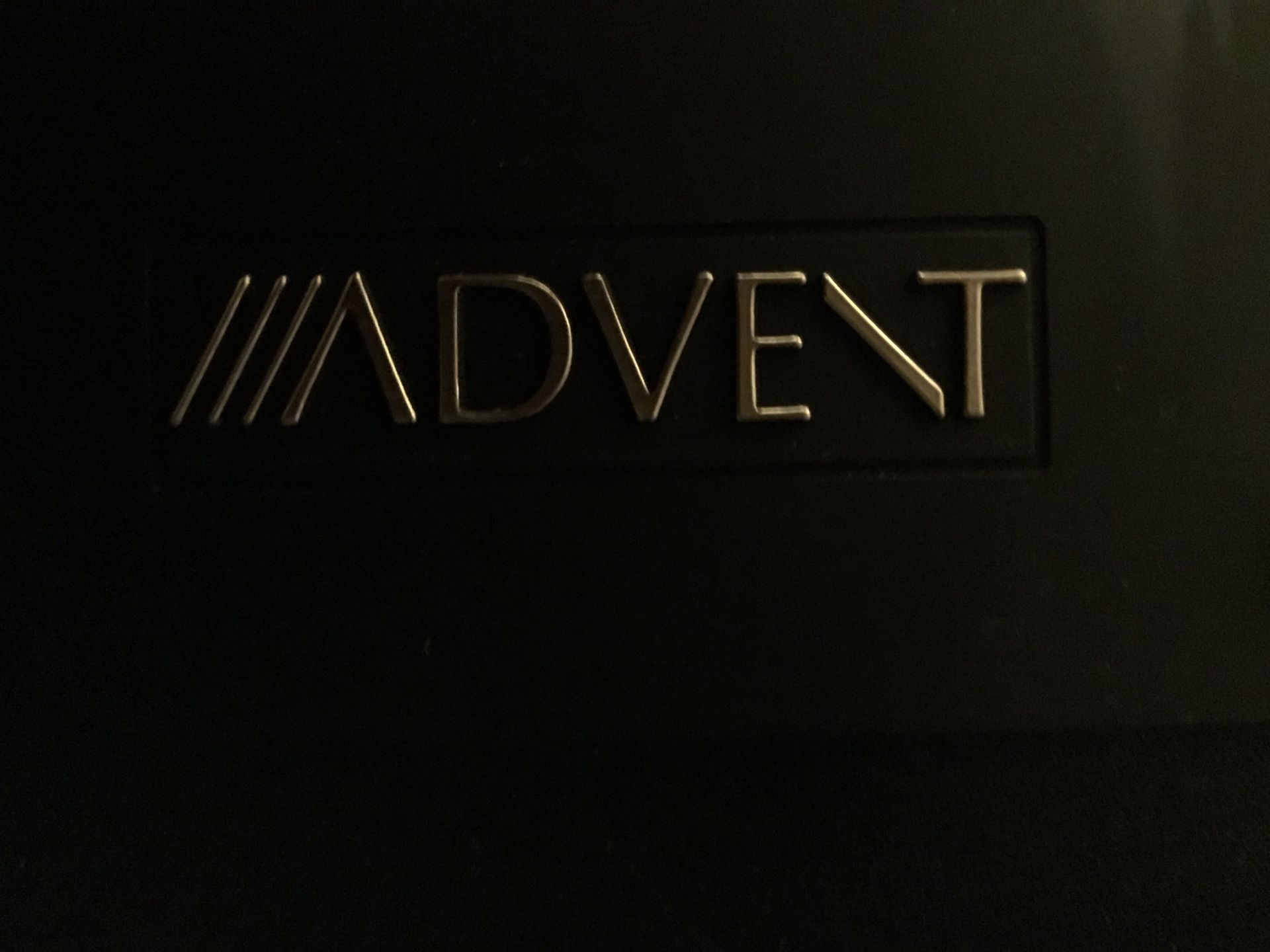Take action
$95
Advent Model 85-951-109 Classic Vintage Powerful Speakers
Posted over 6 years ago in Derby, CT
Listed in categories:
Sold by
Get a second opinion
Chat securely on the app

Additional images
Description
The Large Advent speaker system introduced in 1968 was intended to "compete with the most elaborate and expensive speaker systems at a fraction of their price," and in its time it was widely acclaimed in the hi-fi world. There have been many improvements in loudspeaker design and performance since 1968, of course, and the Advent company (now a division of International Jensen, Inc.) is offering the Legacy as today's "digital ready" successor to the illustrious Large Advent. The "digital ready" aspect of the Advent Legacy refers to its ability to handle very high peak-power levels. According to the manufacturer, it will easily handle 100 watts continuously and has a peak capacity of 500 watts. Like the Large Advent, the Legacy is a two-way system based on a 10-inch long-throw woofer in a sealed (acoustic-suspension) enclosure. The 1-1/2-inch length of the woofer's voice coil, which is wound with copper-clad aluminum wire, ensures that it remains in a uniform magnetic field even at high volume levels. The system crosses over at 2,500 Hz to a 1-inch ferrofluid-filled soft-dome tweeter. There are no external level or balance adjustments. The key performance specifications for the Legacy include a frequency response of 42 to 23,000 Hz ±3 dB, a nominal impedance of 8 ohms (6 ohms minimum), and a sensitivity of 88 dB sound-pressure level (SPL) at 1 meter on-axis with a 1-watt input. The Advent Legacy is a floor-standing system, measuring 28-1/4 inches high, 16 inches wide, and 9-3/4 inches deep. It weighs 46-1/2 pounds. The cabinet is constructed of fiber-board, with black textured-vinyl coating on its sides and back. A black removable grille cloth covers the front, and the base trim and top are solid oiled pecan. Price: $199.95 each Lab Tests The averaged room response of the Advent Legacy was very smooth and uniform from 300 Hz to beyond 19,000 Hz, varying only ±2.5 dB over that range. We found an increased output at lower frequencies, an effect that is dependent on the room acoustics and the placement of the speakers and microphone. We measured the woofer response separately with close microphone spacing to eliminate room effects. It was at its maximum at 130 Hz, falling at about 3 dB per octave above that frequency and at 12 dB per octave below it. When the woofer curve was spliced to the room-response curve, the composite response showed a bass rise of about 5 dB at 100 to 130 Hz relative to typical response levels in the higher frequency range. Overall, the system response was flat within ± 5 dB from 36 to 19,000 Hz. Quasi-anechoic FFT response measurements at a 1-meter distance confirmed our room measurements insofar as smoothness and frequency limits were concerned. They also revealed that the Legacy has excellent dispersion. The response measured on-axis and 30 degrees off-axis diverged significantly only above 12,000 Hz. The system's impedance reached its minimum of 6 ohms at 130 Hz and its maximum of 23 ohms at 53 Hz. Over much of the audio band, the impedance was not far from its 8-ohm rating. The measured sensitivity of the Advent Legacy was 89.5 dB, slightly better than rated. With the speaker driven by a 3-volt signal (corresponding to a 90-dB SPL in the midrange), the bass distortion was in the range of 1.5 to 2 percent from 100 Hz down to 70 Hz, increasing gradually to 3 percent at 50 Hz and 6.4 percent at 40 Hz. The speaker's power-handling ability was confirmed by our tests. At 100 Hz its output began to distort at 410 watts (into 6 ohms), and at 1,000 Hz the waveform clipped at 300 watts (into 14 ohms). Both of these measurements were made close to the woofer cone. At 10,000 Hz we measured the output of the dome tweeter, which required an input of 770 watts (into 6.5 ohms) before its acoustic output waveform became visibly distorted. Comments The Advent Legacy had a smooth, easy listening quality, with a trace of upper-bass heaviness. It has been many years since we tested (or heard) one of the Large Advent speakers, and our test methods have evolved to such a degree in the past eighteen years that little or no correlation would be possible between our earlier measurements and those made on the Legacy. We have the impression that the earlier version had a somewhat more extended deep bass but that the Legacy has better overall smoothness and dispersion characteristics. The frequency-response curves that Advent ran on our test samples (under very different conditions than we used) showed a comparably smooth and flat response, though without the low-frequency emphasis that we found, which would be quite dependent on the speaker's acoustic environment. In any case, such comparisons would be pointless. The Advent Legacy is well able to stand on its own merits. It is certainly a more attractively styled product than its predecessor, thanks to its rounded edges and wood top and base trim. Since its price, in 1986 dollars, is only about 50 percent more than that of the original model, in 1
Details
Condition
Open Box (never used)
Item location map
Map is approximate to keep seller’s location private.
Related searches
- Laptop
- Gaming computer
- Computer monitor
- Hp laptop
- Desktop computer
- Routers
- Computer parts
- Lenovo laptop
- Modem router
- Wifi router
- Refurbished laptops
- Notebook
- Computer keyboard
- Toshiba laptops
- Modem
- Curved monitor
- Asus router
- Hp notebook
- Wireless mouse
- Chromebooks